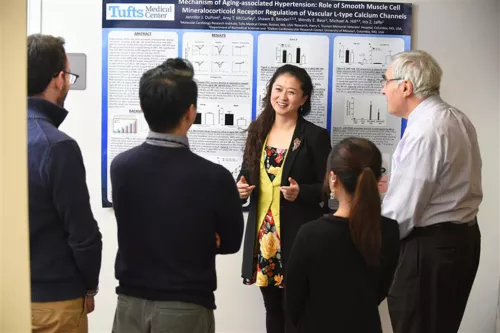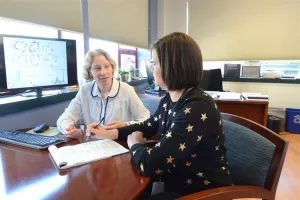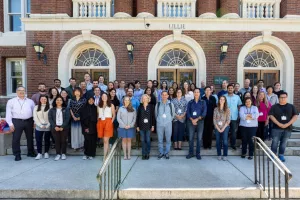Robert Blanton, MD
Research Interests: Heart Failure, Cardiomyopathy, Molecular Signaling, cGMP, Protein Kinase G, Cardiac function, Cardiovascular disease, Mixed Lineage Kinase 3
Email: Robert.blanton@tuftsmedicine.org
Blanton Laboratory
Howard Chen, PhD
Research Interests: Autophagy, Apoptosis, Molecular Imaging, Theranostic nanoprobes, Cardio-oncology, Cardioprotection, Cardiomyopathy, Heart Failure
Email: Howard.Chen@tuftsmedicine.org
Chen Laboratory
Michael Chin, MD, PhD
Research Interests: Hypertrophic and genetic cardiomyopathies, Barth Syndrome, Heart Failure, Genetics, Genomics, Molecular Biology, Transcriptomics, Proteomics
Email: Michael.T.Chin@tuftsmedicine.org
Chin Laboratory
Isabelle Draper, PhD
Research Interests: RNA splicing, Muscular Dystrophy
Email: Isabelle.Draper@tuftsmedicine.org
Draper Laboratory
Jennifer Dupont, PhD
Research Interests: Vascular Function, Estrogen, Aging, Arterial Stiffness, Sex Differences in Cardiovascular Disease
Email: Jennifer.Dupont@tuftsmedicine.org
Dupont Laboratory
Jonas Galper, MD, PhD
Research Interests: Metabolic Heart Disease, Impact of Type II Diabetes and Metabolic Syndrome on the Heart, Heart Failure with Preserved Ejection Fraction, Ventricular Tachycardia, Atrial Fibrillation, Ion Channel Dysfunction, Calcium Signaling
Email: Jonas.Galper@tuftsmedicine.org
Galper Laboratory
Miranda Good, PhD
Research Interests: Stroke, Alzheimer's disease, Neurovascular Function, Neuroinflammation, Cerebral Blood Flow Regulation, Pannexin1 Channels
Email: Miranda.Good@tuftsmedicine.org
Good Laboratory
Gordon Huggins, MD
Research Interests: Genetics, Cardiomyopathy, Heart Failure, Valve Disease, Atherosclerosis
Email: Gordon.Huggins@tuftsmedicine.org
Huggins Laboratory
Basak Icli, PhD
Research Interests: Obesity, Type-2 Diabetes, Acute Myocardial Infarction, Wound Healing, MicroRNA, Angiogenesis, Inter-organ Cross-talk, Brown Adipose Tissue
Email: Basak.Icli@tuftsmedicine.org
Icli Laboratory
Iris Jaffe, MD, PhD
Research Interests: Atherosclerosis, Hypertension, Vascular Biology, Aging, Sex Differences in Cardiovascular Disease, Mineralocorticoid Receptors, Cardio-oncology
Email: Iris.Jaffe@tuftsmedicine.org
Jaffe Laboratory
Navin Kapur, MD
Research Interests: Heart Failure, Cardiogenic Shock, Cardiac Fibrosis, Heart Failure Device Development, Impact of Circulatory Support Devices on Cardiac Molecular Biology
Email: Navin.K.Kapur@tuftsmedicine.org
Kapur Laboratory
Lakshmi Pulakat, PhD
Impact of Obesity and Diabetes on the Heart, Wound Healing, Sex Differences in Cardiovascular Disease, Angiotensin Type 2 Receptors, G protein-coupled Receptors, Drug Development
Email: Lakshmi.Pulakat@tuftsmedicine.org
Pulakat Laboratory














